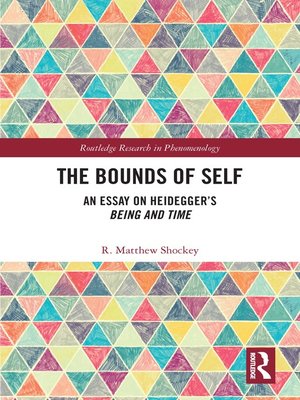The Bounds of Self
ebook ∣ An Essay on Heidegger's Being and Time · Routledge Research in Phenomenology
By R. Matthew Shockey

Sign up to save your library
With an OverDrive account, you can save your favorite libraries for at-a-glance information about availability. Find out more about OverDrive accounts.
Find this title in Libby, the library reading app by OverDrive.



Search for a digital library with this title
Title found at these libraries:
| Library Name | Distance |
|---|---|
| Loading... |
This book provides a systematic reading of Martin Heidegger's project of "fundamental ontology," which he initially presented in Being and Time (1927) and developed further in his work on Kant. It shows our understanding of being to be that of a small set of a priori, temporally inflected, "categorial" forms that articulate what, how, and whether things can be.
As selves bound to and bounded by the world within which we seek to answer the question of how to live, we imaginatively generate these forms in order to open ourselves up to those intra-worldly entities which determinately instantiate them. This makes us, as selves, the source and unifying ground of being. But this ground is hidden from us – until we do fundamental ontology. In showing how Heidegger develops these ideas, the author challenges key elements of the anti-Cartesian framework that most readers bring to his texts, arguing that his Kantian account of being has its roots in the anti-empiricism and Augustinianism of Descartes, and that his project relies implicitly on an essentially Cartesian "meditational" method of reflective self-engagement that allows being to be brought to light. He also argues against the widespread tendency to see Heidegger as presenting the basic forms of being as in any way normative, from which he concludes, partially against Heidegger himself, that fundamental ontology is, while profound and worth pursuing for its own sake, inert with respect to the question of how to live.
The Bounds of Self will be of interest to researchers and advanced students working on Heidegger, Kant, phenomenology, and existential philosophy.







